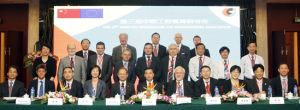CLUSTER, an association of twelve leading scientific-technical universities in Europe, and eighteen leading Chinese universities have agreed on a closer cooperation in engineering education: The “Harbin Roadmap“, among other things, plans to offer a Chinese-European doctoral school for sustainability engineering, a double master degrees program, and postgraduate summer and winter schools.
Chairman of CLUSTER, KIT President Professor Eberhard Umbach, and representative of the Chinese universities, Vice President of Harbin Institute of Technology REN Nanqi, signed the “Harbin Roadmap” on the occasion of the “3rd Sino-EU Workshop on Engineering Education“ in Harbin, China. With this agreement, CLUSTER (Consortium Linking Universities of Science and Technology for Education and Research), that has been existing for more than two decades, has reached a significant milestone in the cooperation with its international partners. CLUSTER is committed to promoting progress and exchange in research, teaching, and innovation.
In 2010, CLUSTER together with 18 leading Chinese technical and scientific universities established the “Sino-European Engineering Education Platform“ (SE3P) in Shanghai to advance cooperation in the education of engineers. Placing emphasis on the promotion of gifted students, student exchange, advanced training for lecturers, development of teaching materials, and cooperation in research projects, the objective is to raise engineering education to the highest level. All partner institutions will mutually profit from the expertise of the Chinese and European universities.
The ”SE3P Double Master Degrees Program“ is open to European and Chinese Students. Summer and winter schools are to bring together postgraduates from Europe and China and strengthen the links between the universities. The European and Chinese universities will enhance engineering education and expand cooperation with the industry. Besides, a number of activities, such as an engineers competition and a students’ summer school, are planned for 2013.
The next Sino-EU Workshop on Engineering Education will take place in 2013 in Karlsruhe under the CLUSTER presidency of the KIT.
Being “The Research University in the Helmholtz Association”, KIT creates and imparts knowledge for the society and the environment. It is the objective to make significant contributions to the global challenges in the fields of energy, mobility, and information. For this, about 10,000 employees cooperate in a broad range of disciplines in natural sciences, engineering sciences, economics, and the humanities and social sciences. KIT prepares its 22,800 students for responsible tasks in society, industry, and science by offering research-based study programs. Innovation efforts at KIT build a bridge between important scientific findings and their application for the benefit of society, economic prosperity, and the preservation of our natural basis of life. KIT is one of the German universities of excellence.

